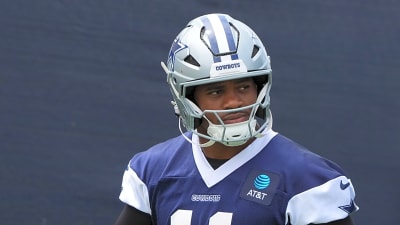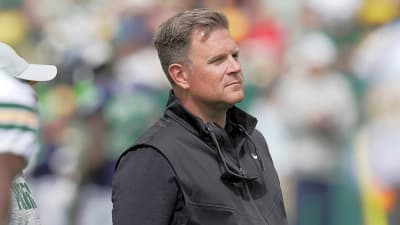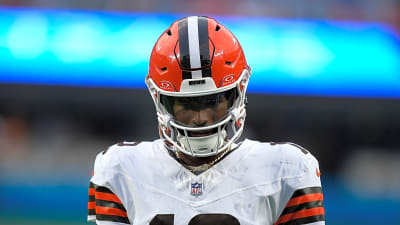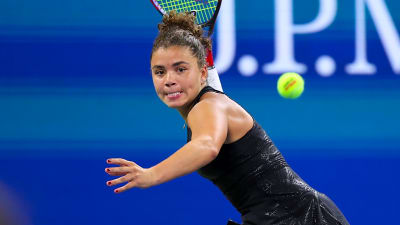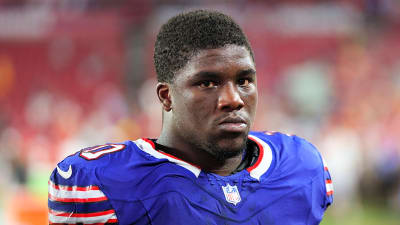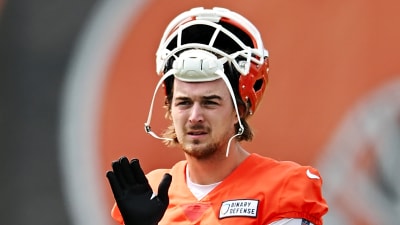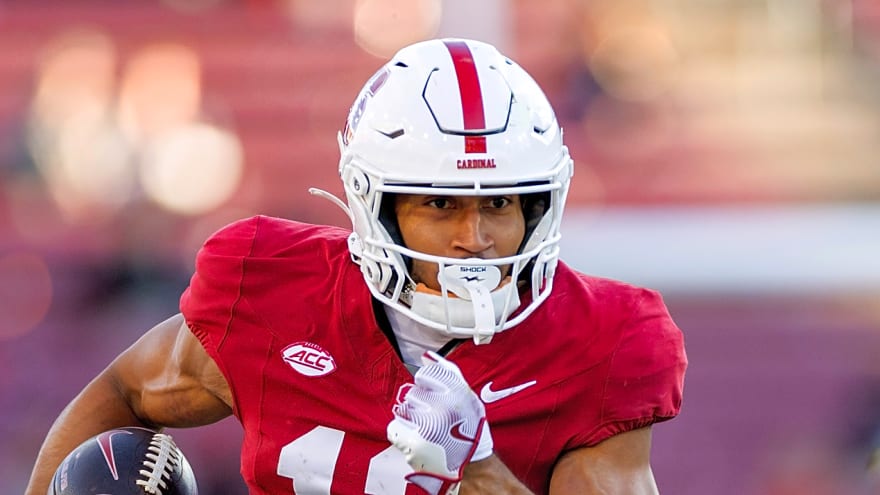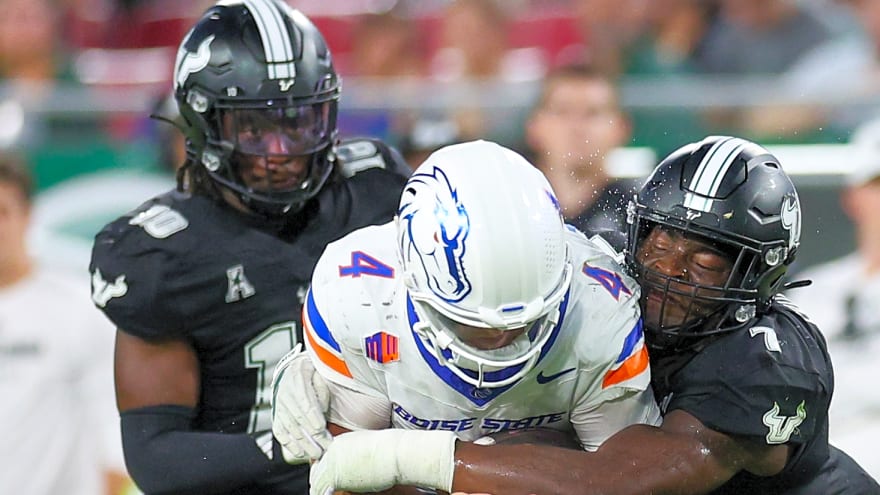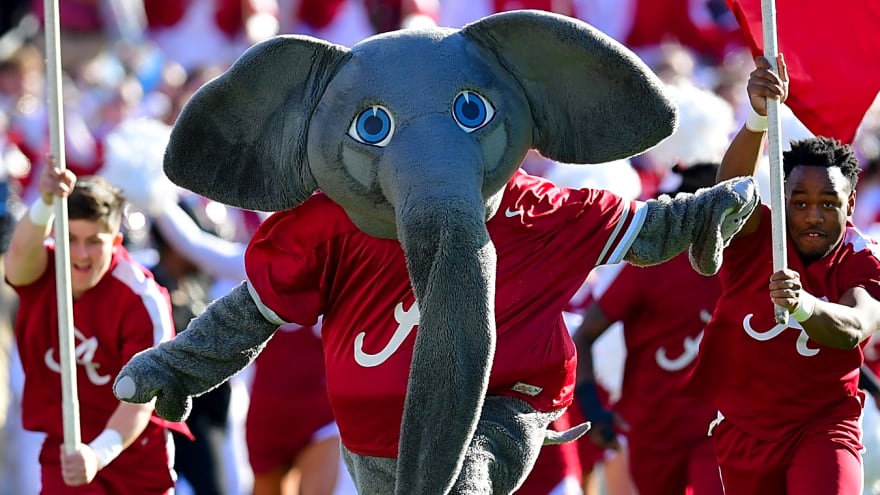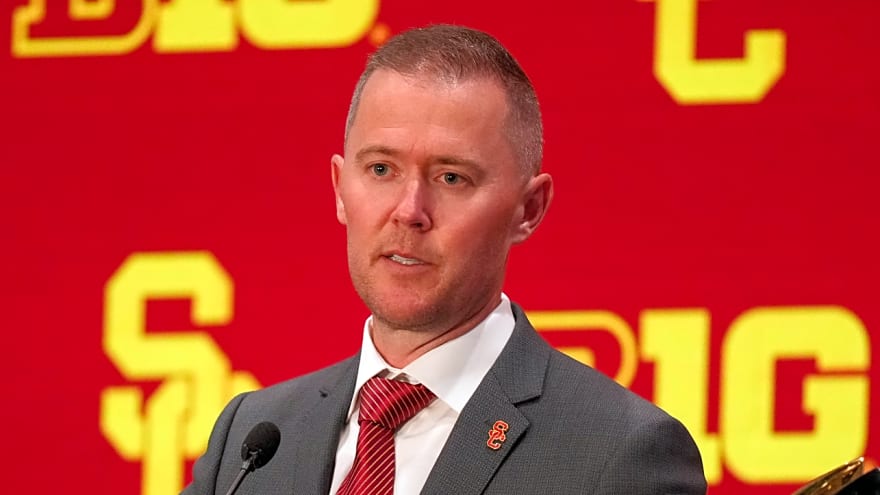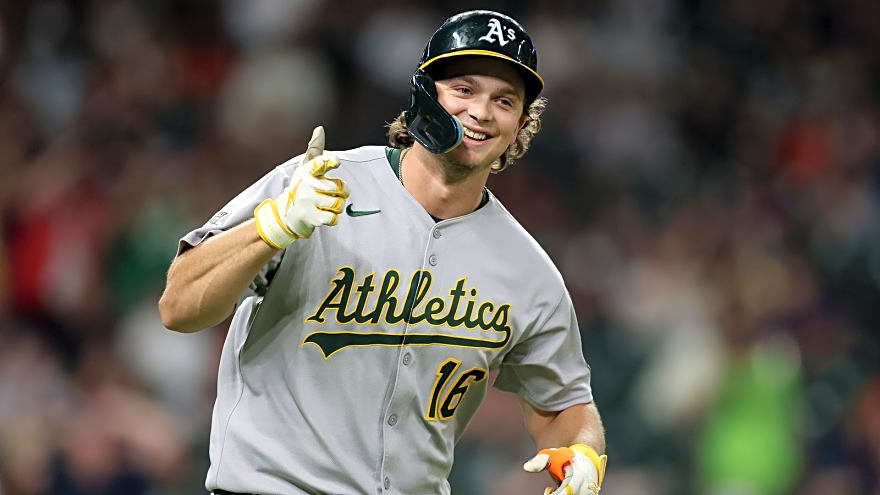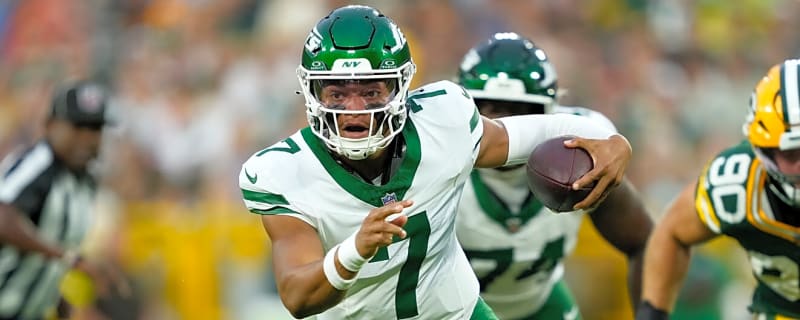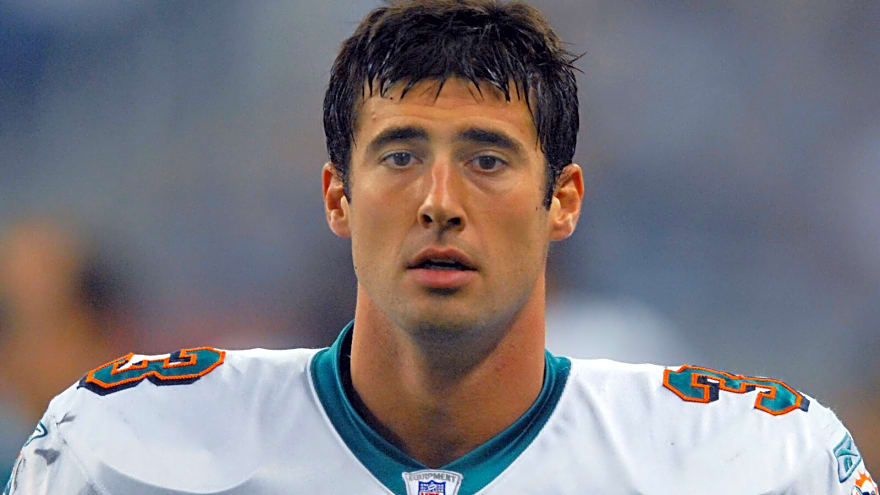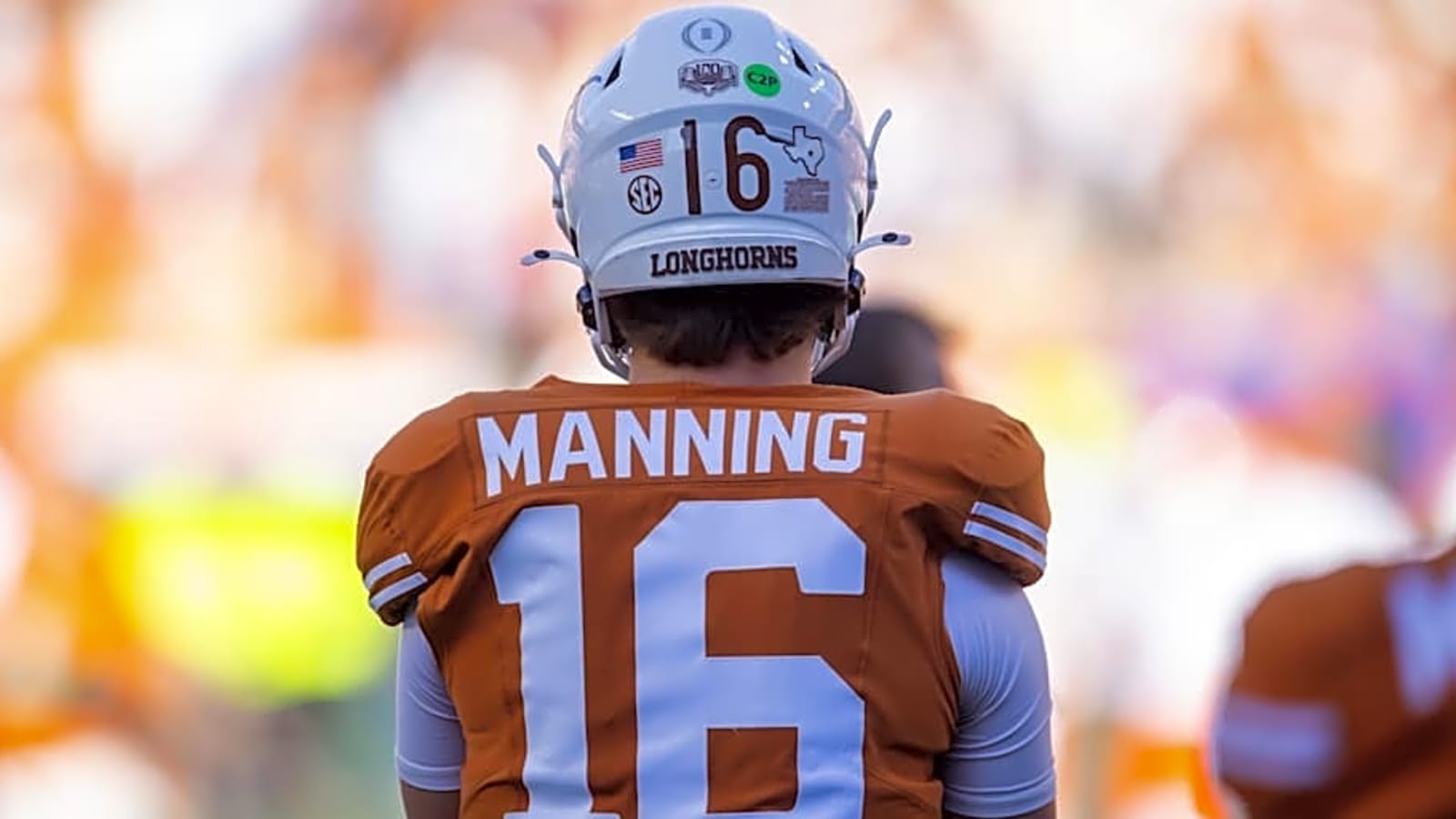
In Monday edition's of The McShay Report, NFL Draft expert Todd McShay studies Texas Longhorns quarterback Arch Manning, focusing on his tape and identifying what can be expected of him moving forward.
McShay came away impressed with Manning after analyzing the 70 plays PFF categorized as his "key plays." However, a full season at the helm of the Longhorns will produce consistent challenges for Manning, a situation he's never experienced before.
"We still need to see how Arch fares against top-level competition in the SEC next season—the game looked fast for him against Georgia in the regular season last year—but I really like what I’ve seen on balance thus far," McShay writes.
And what comes with being Texas' starter is being the focal point for defenses' preparation week in and week out. While he got a taste of what defenses might throw at him when he stepped in during Quinn Ewers' injury -- facing UL Monroe and Mississippi State -- this season is a whole new test.
"Now that he’s the guy, he needs to prove that he can handle the pressure of being the team’s leader and learning full installments on a weekly basis," McShay writes. "Questions certainly remain—How will he adjust when SEC coordinators identify his tendencies? Will he improve his internal clock? How consistent will he be when he finds success?—as they would with any player at this stage of his career."
The questions McShay raises will be answered as he gains more time under center. In his college career thus far, Manning has played a mere 233 snaps, contextualizing what a full season under Manning's belt will do for his development.
McShay believes that Manning won't be a member of the 2026 draft class. His verdict is rooted in the fact that both of his uncles, Peyton and Eli, spent four years in college before entering the NFL -- a prioritization of development -- and that we've seen success from four-year college quarterbacks recently.
Whether or not he's planning to declare in 2026, Manning will be watched closely by the football world this season with the expectation that he's going to be a top draft pick in the next two years. The pressure is on -- arguably the most for any college football player in the country -- but McShay has faith in Manning as a player and prospect.
"I’m going to be betting on Arch’s talent and trusting that the improvements I observed across such a small sample size will continue compounding as he sees his role grow and responsibilities increase," McShay writes.
If there is an ideal place for an all-around talented quarterback to continue learning, growing and succeeding at the college level, it's in Austin, Texas with Steve Sarkisian.
More must-reads:
- Post-Ashton Jeanty era gets off to brutal start for No. 25 Boise State
- Why continuing USC-Notre Dame series is critical to sport's success
- The 'Most 1,000-rushing yard NFL seasons' quiz
Breaking News
Trending News
TODAY'S BEST

No. 25 Boise State becomes first ranked team upset in CFB season
Week 1 of the college football regular season is off to an exciting start with an upset during the first game on Thursday night. No. 25 Boise State entered its contest on the road against unranked South Florida looking to keep the momentum they gained last season when they made the College Football Playoff with star running back Ashton Jeanty. The Broncos' offense looked out of sync without the Las Vegas Raiders first-round pick, gaining only 122 rushing yards (fewer than Jeanty's 131.5 rushing yards per game in 2024) and fumbling five times (three lost) in a 34-7 loss to the Bulls at Raymond James Stadium. USF quarterback Byrum Brown had a huge night, going 16-of-24 passing for 210 yards. He added 43 yards and two touchdowns on 14 carries, including faking out a Broncos defender on a 15-yard touchdown run to put the Bulls up 24-7 with 1:44 remaining in the third quarter. Brown almost had a third touchdown, but it was called back for a holding penalty. The victory was the Bulls first win over a top 25 program since they knocked off No. 16 Notre Dame, 23-20, in 2011. The win will surely give South Florida confidence before they travel to play No. 15 Florida in Week 2 and then travel to play No. 10 Miami in Week 3. Boise State faces an uphill battle to make the CFP for a second consecutive season following the upset on Thursday night. The Mountain West program has a must-win game coming up against No. 6 Notre Dame on Oct. 4, the only ranked opponent on their schedule. The Broncos offense will need to find an identity soon, because it looked awful against USF in Week 1.

Micah Parsons had incredible reaction to Packers trade
The Green Bay Packers’ blockbuster trade to acquire Micah Parsons from the Dallas Cowboys altered the landscape of the NFL, and raised the expectations in Titletown for 2025 and beyond. Parsons immediately bolsters the Packers’ pass rush and, opposite Rashan Gary, has the potential to be a true difference-maker on a roster built to make a deep playoff run. Micah Parsons fired up after Packers trade While those inside the league both resoundingly praised general manager Brian Gutekunst and the Packers while lampooning Cowboys owner Jerry Jones, Parsons’ reaction of pure joy may have been best of all. Parsons has plenty of reason to celebrate between the change of scenery and the fact that he’ll collect $188 million with $120 million fully guaranteed on his new contract with the Packers. The All-Pro will also get the chance to exact some revenge on Jones and his former team when the Packers take on the Cowboys on Sunday Night Football in Week 4.
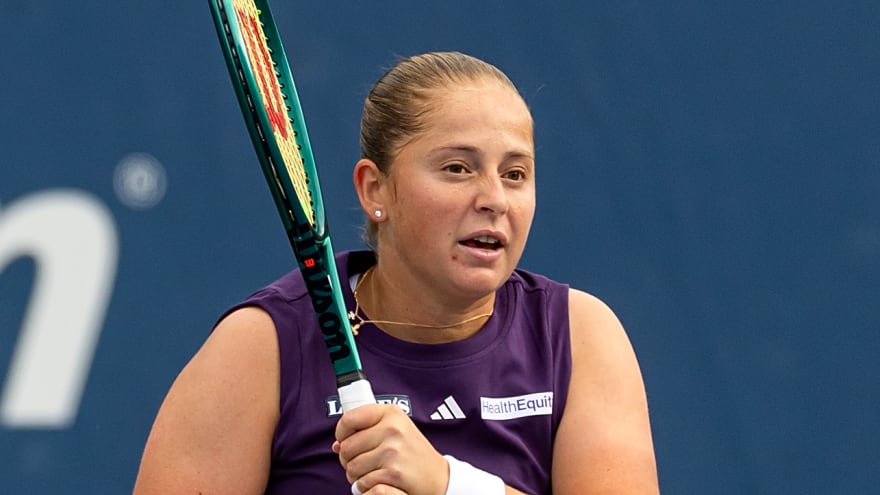
Jelena Ostapenko responds to racism allegations after post-match confrontation with Taylor Townsend

Knicks can fortify backcourt with ideal feee agent point guard
The New York Knicks have a strong backcourt as is, but could use one more playmaker should injuries plague their roster next season. Knicks: Monte Morris is a logical option in free agency Among the options remaining in unrestricted free agency is Monte Morris. A reliable backup veteran floor general of his ilk could service New York well. Morris averages 9.5 points with an uber-efficient shooting line of 47.4 percent from the field, 38.9 percent from three-point range, topped off with 82.7 percent from the free throw line for his career. The Iowa State product averaged 5.3 assists per game in 2022-23. He hovers just below four APG for his career. A playoff-tested Morris is what the Knicks need With 57 games of postseason experience under his belt, Morris can bring veteran leadership to New York’s locker room. He also dictates the pace well on the court. Though the Knicks were a noticeably good passing team last season, the ball club does not have another volume passer behind All-NBA point guard Jalen Brunson, though Jordan Clarkson is an elite scorer off the bench. Miles McBride is a promising two-way guard alongside him. Thus, Morris would be a quintessential depth option for New York to house. Should his number be called at any point in the season, he’d be a piece that could start or play substantive minutes off the bench.

ESPN Analyst Praises Dallas Cowboys For Prioritizing Culture In Micah Parsons Trade
The Dallas Cowboys sent shockwaves through the NFL world when they traded superstar linebacker Micah Parsons to the Green Bay Packers for two first-round picks and defensive tackle Kenny Clark. While fans and analysts struggled to comprehend how a team could trade away their best defensive player, a compelling narrative quickly emerged from media circles: this wasn’t about talent—it was about culture. ESPN’s Kirk Herbstreit became one of the most vocal proponents of this perspective, arguing that the Cowboys made the right choice by prioritizing team chemistry over individual excellence. According to this narrative, Parsons had become a toxic presence in the locker room, creating drama that undermined head coach Brian Schottenheimer’s efforts to build a winning culture. But as the dust settles on this blockbuster trade, questions remain about whether this explanation holds water or represents a convenient way to justify an otherwise questionable decision. The Culture Argument: Why The Dallas Cowboys Traded Micah Parsons The culture-based defense of the Parsons trade centers on several key points that paint the linebacker as a disruptive force despite his on-field brilliance. Herbstreit and other supporters of this view argue that Parsons’ contract holdout and training camp behavior created a negative atmosphere that the coaching staff couldn’t ignore. “This is a new coach, trying to build a new culture, and your Alpha—your best player—is out, is sitting out in a negotiation that’s not working out,” Herbstreit explained during his ESPN appearance. The implication is clear: even elite talent becomes a liability when it undermines team unity and coaching authority. The timing aspect adds weight to this argument. Schottenheimer inherited a Cowboys team with a reputation for underachieving despite talent advantages. Previous coaching regimes struggled to manage strong personalities and create accountability. From this perspective, trading Parsons sends a clear message that no player, regardless of ability, is bigger than the team. Proponents also point to the “constant drama” that has plagued Dallas for years. The Cowboys have become synonymous with off-field distractions, social media controversies, and internal conflicts that overshadow their football performance. If Parsons contributed to this environment, removing him could theoretically create space for a more focused, unified approach. The “alpha player” argument suggests that star players who don’t buy into the team concept can poison entire locker rooms. When the best player on defense publicly challenges coaches or creates drama through contract negotiations, it potentially gives other players permission to do the same. Building a championship culture might require sacrificing individual talent for collective chemistry. A Closer Look at the Justification While the culture argument sounds compelling in theory, several aspects of this explanation raise red flags about its validity. The timing and specificity of these character concerns seem suspiciously convenient for an organization facing widespread criticism. First, the vague nature of Parsons’ alleged cultural problems is telling. Despite years of coverage and insider access, specific examples of locker room disruption or toxic behavior remain largely unsubstantiated. Contract negotiations, while frustrating for teams, represent standard business practices throughout the NFL. Framing legitimate contract discussions as cultural problems seems like a stretch. The sudden emergence of these concerns also appears suspicious. Parsons spent four years in Dallas without widespread reports of character issues or locker room problems. His teammates consistently spoke positively about him, and he earned respect for his work ethic and leadership. The timing of these cultural concerns coinciding with trade rumors suggests they might be more about justification than genuine evaluation. Furthermore, the Cowboys’ track record with “culture building” undermines confidence in their decision-making process. This is the same organization that has struggled with similar issues for decades under Jerry Jones’ ownership. Previous attempts to address culture through personnel moves haven’t yielded championship results, raising questions about whether this approach represents genuine wisdom or repeated mistakes. The inconsistency in applying cultural standards also stands out. The Cowboys have historically retained players with documented off-field issues while trading away their most productive defenders. If culture truly drives decision-making, this selective application suggests other factors might be more influential. Was This Really the Right Move? The most damning evidence against the culture argument lies in the simple mathematics of NFL success. Elite pass rushers like Parsons are extraordinarily rare and valuable commodities. Teams regularly win championships despite managing difficult personalities, but they rarely succeed without elite defensive talent. Championship teams throughout NFL history have found ways to manage strong personalities rather than trading them away. The New England Patriots built a dynasty while managing various ego-driven stars. The Tampa Bay Buccaneers won a Super Bowl with Antonio Brown despite his well-documented behavioral issues. These examples suggest that winning organizations find solutions rather than surrendering elite talent. The return package, while substantial, doesn’t offset losing a generational defensive player entering his prime. Kenny Clark brings veteran leadership and solid production, but he’s not a game-changing difference-maker like Parsons. The two first-round picks represent potential, but draft picks carry inherent risk and won’t immediately improve the team’s championship prospects. The timing of this trade also raises strategic concerns. Trading your best defensive player before a season where you’re expected to compete suggests either poor roster construction or misaligned priorities. If the Cowboys truly believed they were contenders, keeping Parsons would maximize their championship window. The culture justification ultimately feels like post-hoc rationalization for a decision driven by other factors—perhaps salary cap concerns, philosophical differences, or organizational dysfunction. When teams struggle to explain personnel moves through traditional football analysis, convenient narratives about character and culture often emerge as backup explanations. The Dallas Cowboys may eventually prove that prioritizing culture over talent leads to championship success. However, the available evidence suggests this explanation serves more to justify a questionable decision than to explain a strategic masterstroke. True championship cultures typically find ways to maximize elite talent rather than trading it away.
Customize Your Newsletter
 +
+
Get the latest news and rumors, customized to your favorite sports and teams. Emailed daily. Always free!

